#Ukraine 2030
Explore tagged Tumblr posts
Text
2030... aus der Traum?
Ich hatte es gewagt zu träumen. Gewagt meine Träume zu verkünden. Hatte es gewagt die Träume in etwas Greifbares zu verwandeln. (solltest du dich gerade fragen was ich meine, dann lies am Besten hier nochmal nach) Aus der Traum! Putin’s Angriffskrieg steht dem entgegen. Es steht inzwischen fest: Ich bekomme mein bestelltes und bereits vorausbezahltes Fahrzeug nicht. Der Grund: mein Buhanka…

View On WordPress
#2030#altai#amur#armenien#dagestan#georgien#iran#kamtschatka#kasachstan#kaukasus#mongolie#persien#photo travel#russland#sibirien#skandinavien#tatschikistan#travel#ukraine#usbekistan
2 notes
·
View notes
Text
"It’s technically possible for the UK to achieve its goal of having a clean power system by 2030, and doing so should reduce electricity bills and bolster the country’s energy security, the grid operator says in a study commissioned by the new Labour government.
The context
The UK recently shut its last coal-fired power plant and aims to slash its use of gas turbines as it seeks to all but eliminate fossil fuels from its electricity mix by the end of the decade.
In 2023, renewables and nuclear accounted for 62% of the country’s electrical output, while fossil fuels held a 38% share. Under the 2030 clean power target, fossil fuels (gas) would be reduced to less than 5% of the mix.
The latest
“The analysis concludes that clean power is a huge challenge but is achievable for Great Britain by 2030,” the National Energy System Operator said in a statement as it published the study.
Overall system costs are unlikely to increase if the target is met, and tariffs could in fact decline as legacy power contracts expire and if the state makes sufficient progress on energy efficiency gains, flexibility mechanisms, improving grid connection processes, and overall policy modernisation.
Significant investments are required in a short amount of time, but they would allow the UK to become a “leader” in new technologies while also reducing the country’s exposure to potential energy price shocks stemming from spikes in international gas prices, as was the case after Russia invaded Ukraine.
NESO’s analysis shows that clean technologies — renewables and nuclear — will be able to produce at least as much power as Great Britain consumes in total in 2030...
“A clean power system for Great Britain will deliver a backbone of home-grown energy that breaks the link between volatile international gas prices; that is secure and affordably powers our homes and buildings; that decarbonises the transport that we take to school and work; that drives the businesses of today and catalyses the innovations of the future.”
Next steps: The government will now consider NESO’s advice as it develops its clean power action plan later this year."
-via The Progress Playbook, November 5, 2024
#uk#united kingdom#clean energy#renewables#wind power#solar power#fossil fuels#decarbonization#europe#good news#hope
398 notes
·
View notes
Text
The Best News of Last Week - January 15, 2024
🎊 - As we embark on another journey around the sun, I am thrilled to bring you the first newsletter of the year, packed with inspiring, informative, and sometimes downright amusing stories.
1. Marijuana meets criteria for reclassification as lower-risk drug
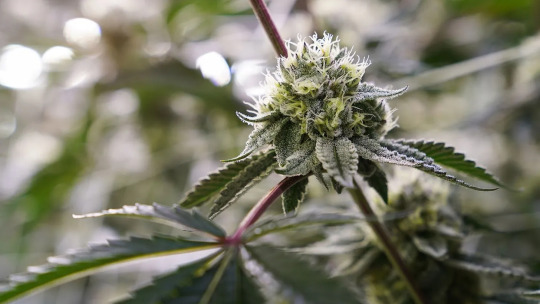
Marijuana has a lower potential for abuse than other drugs that are subjected to the same restrictions, with scientific support for its use as a medical treatment, researchers from the US Food and Drug Administration say in documents supporting its reclassification as a Schedule III substance.
2. South Korea passes law banning dog meat trade

The slaughter and sale of dogs for their meat is to become illegal in South Korea after MPs backed a new law. The legislation, set to come into force by 2027, aims to end the centuries-old practice of humans eating dog meat.
3. After 20 years in a tiny cage, these 'broken bears' are finally feeling the grass beneath their paws
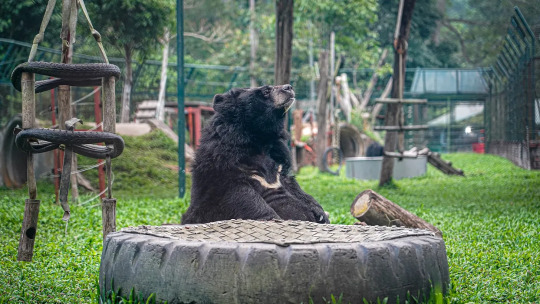
These bears, termed "broken bears" due to physical and psychological trauma from years of abuse, are treated at the Tam Dao rescue center with individually tailored diets, physiotherapy, and medical care. The bear bile trade, which involves extracting bile for traditional Asian medicine, has been illegal in Vietnam since 2005, but a black market still exists.
4. France just got its first openly gay prime minister.
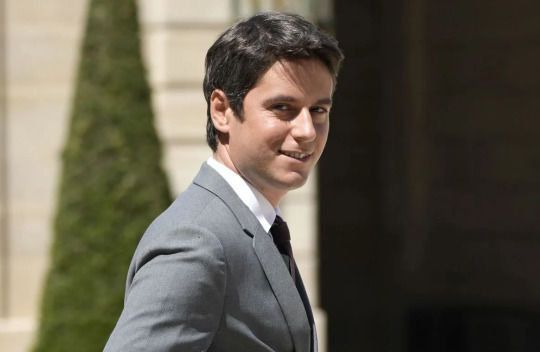
Gabriel Attal is France’s youngest-ever prime minister at age 34 and the first who is openly gay.
5. Australian ‘builders without borders’ repairing war-torn homes and schools in Ukraine

Manfred Hin, a 66-year-old builder from Townsville, Australia, spent most of 2023 volunteering in Ukraine to rebuild homes and schools damaged by Russian attacks. Having contributed to over 50 house and a dozen school renovations, he worked with Ukrainian charity Brave to Rebuild, mentoring young volunteers and sourcing three tonnes of donated tools.
Inspired by Hin's story, Tasmanian carpenter Hamish Stirling also joined the efforts, learning Ukrainian, traveling to Europe, and volunteering for three months to help rebuild homes.
6. The age-standardized death rate from cancer has declined by 15% since 1990
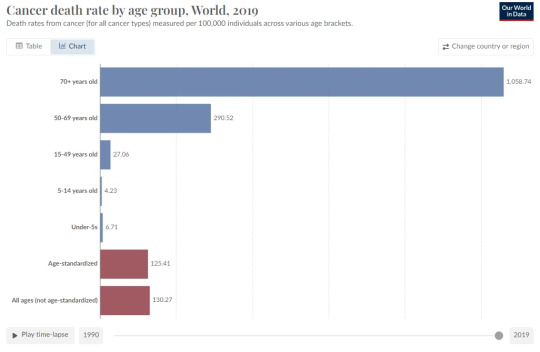
The age-standardized death rate from cancer declined by 15%
Cancer kills mostly older people – as the death rate by age shows, of those who are 70 years and older, 1% die from cancer every year. For people who are younger than 50, the cancer death rate is more than 40-times lower (more detail here).
7. Germany Reached 55% Renewable Energy in 2023
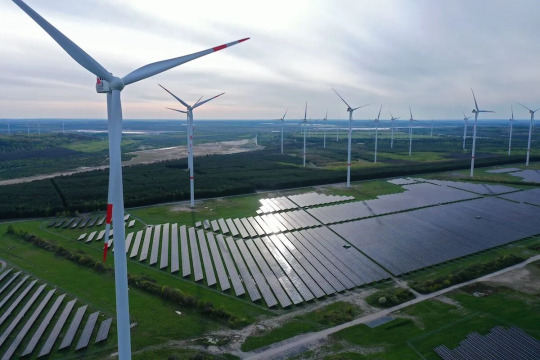
In 2023, 55 percent of Germany’s power came from renewables — an increase of 6.6 percent, according to energy regulator Bundesnetzagentur, reported Reuters. Europe’s biggest national economy has a goal of 80 percent green energy by 2030.
---
That's it for this week :)
This newsletter will always be free. If you liked this post you can support me with a small kofi donation here:
Buy me a coffee ❤️
Also don’t forget to reblog this post with your friends.
505 notes
·
View notes
Text
The near future in the Doctor Who universe sure gets dire doesn't it? Especially if Mad Jack / Roger ap Gwilliam is still part of history.
I thought I'd have a bit of fun listing things out, combining as many sources as possible. Turns out he fits in shockingly well with what we know. There's a lot missing here or cut out, and for obvious reasons it's very UK / Europe focused, but nonetheless:
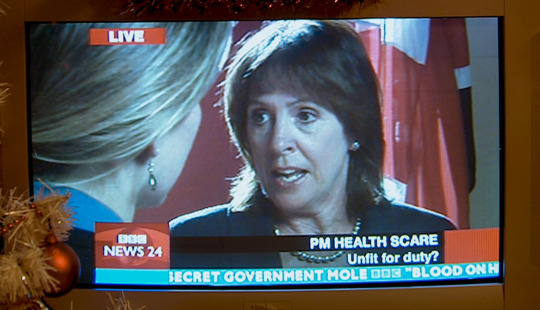
[ID: Scene from The Christmas Invasion showing Harriet Jones on BBC News. The news ticker reads "PM HEALTH SCARE", "Unfit for duty?", and references a "SECRET GOVERNMENT MOLE" and a quote: "BLOOD ON [HER HANDS]".]
2006-2021 (obviously the past now, but still noting for the resulting temporal and political butterfly effect) - In the original timeline, Harriet Jones remains Prime Minister for 3 consecutive terms, presumably 15 years assuming no snap election was called, referred to as a 'golden age' [World War Three]. The Tenth Doctor deliberately changes history to cause her deposal [The Christmas Invasion], leading to numerous disastrous terms in the meantime, including those of Harold Saxon [The Sound of Drums et al.], Brian Green (who tried to appease the 456) [Children of Earth], Boris Johnson (an auton host of the Nestene Consciousness) [Rose (novelisation)], and Jo Patterson (responsible for deploying cloned Dalek defence drones in the UK's streets) [Revolution of the Daleks].
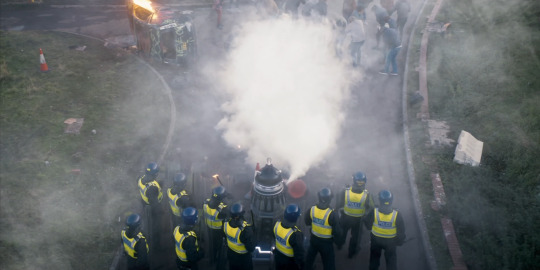
[ID: Scene from Revolution of the Daleks. A 'defence drone' Dalek is used to support anti-riot police in a test, dispersing protestors with mock tear gas.]
2010s-2030s - The European Union gradually integrates further, eventually becoming the European Zone / Eurozone, a global superpower which competes with the USA through the 21st century. The UK eventually forms part of the bloc [Trading Futures].
It's likely that Harriet Jones's deposal led to this and related events being delayed or erased, with Brexit (driven by, among others, one of Jones's successors in the new timeline) reducing european unity. Most notably, Ramón Salamander's rise to power occurs now not in the 2010s [The Enemy of the World], but in the 2030s [Doctor Who and the Enemy of the World]. There are other events that are seemingly delayed by ~20 years by changes to the timeline, including future events like the dictatorship of Mariah Learman [The Time of the Daleks, Trading Futures], and yet also possibly past events like the death of Queen Elizabeth II [Battlefield, The Longest Night et al.], which may suggest something else (eg. the Time War) may be responsible.
~2030 - During a time of rising global tensions [73 Yards], Ramón Salamander convinces a group of scientists in an underground shelter endurance experiment that nuclear war has broken out on the surface. They are convinced to generate artificial "natural" disasters to fight back against the enemy. Between this and ongoing climate change, several global food sources collapse as a result, including Canada and Ukraine's corn and flour production [The Enemy of the World].
2031 - Tensions culminate in the "Great Russian War". Despite posturing, not a single nuclear weapon is fired, at least by NATO [73 Yards]. This may be later considered World War III [Trading Futures].
~2032-2035 - Following the war, tensions rise again, now between the Eurozone and the USA [Trading Futures], possibly in reaction to actions (or lack thereof?) taken by NATO during the war [73 Yards]. Both send separate peacekeeping forces to conflict in North Africa. Meanwhile, Italy is engaged in civil war [Trading Futures].
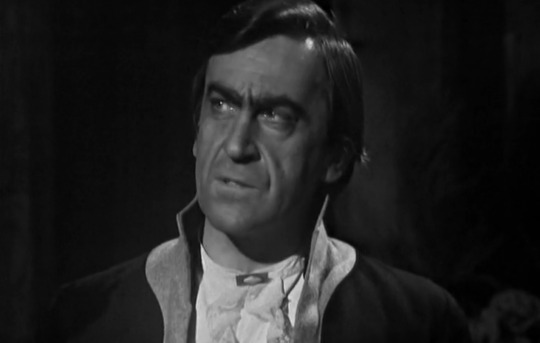
[ID: Scene from The Enemy of the World, showing Ramón Salamander.]
Over the decade, Ramón Salamander rises in power in the World Zone Authority, using his patented "Sun Store" satellite technology to aid the growth of crops by controlling sunlight over agricultural regions. In the background, he murders and blackmails officials to place loyalists into powerful positions, with the goal of ruling over the World Zone Authority as a dictator. Salamander's treachery is later discovered and he disappears [The Enemy of the World].
2037 - 2042 - Several militia declare wars of Independence from the USA. Notably, Phoenix, Arizona is destroyed in a terrorist attack. While the country largely persists after the conflicts, some territories seem to successfully secede - with, for example, a Montana Republic seemingly being in existence in 2054 [Alien Bodies].
2038 - The World Zones Accord is signed. This is later considered to have reduced the United Nations to a 'joke' compared with the World Zone Authority [Alien Bodies]. Given the extensive power it gives to the WZA, this was likely originally part of Salamander's plan, but due to his disappearance he is not around to reap the rewards [The Enemy of the World].
2039 - A group of Mexican astronauts studying minerals on the Moon go missing [Kill the Moon].
~2030s - 2040s - The Earth begins to experience major climate change effects, including "appalling storm conditions" which harm agriculture [The Waters of Mars]. The ice caps melt and flood much of the Earth [K9] with nations like the Netherlands ending up entirely flooded [St Anthony's Fire]. Some regions experience corrosive acid rain [Cat's Cradle: War Head, Strange Loops]. One summer sees Britain experience a 22 week drought. At this time, the Eurozone closes its borders to millions of North African and Baltic Sea refugees [Hothouse]. This time period may be known as the "Oil Apocalypse" [The Waters of Mars].

[ID: Scene from K9 Episode 13: Aeolian. Big Ben stands in the middle of a colossal storm of wind and rain.]
With Earth's ecosystems collapsing [Davros], humanity begin to realise it's facing extinction [The Waters of Mars]. An artificial cooling agent is spread in the atmosphere to semi-successfully combat the effects, but leads to dramatic side-effects, including freezing some areas of the globe. This is known as the "Great Cataclysm" [K9].
2041 - A three-human team, including Adelaide Brooke, lands on Mars for the first time [The Waters of Mars]. However, with this accomplishment, and increasing turbulence on Earth, Humanity gradually loses interest in space exploration [Kill the Moon].
Before 2045 - Around this time, the UK falls into a dictatorship ruled by the "Director", head of a military council that has allegedly (secretly?) controlled the government since 2028 [Britain Protests]. It is possible that this Director was previously the "Minister of War" for previous governments [Before the Flood].
2045 - The World Zones Authority evolves into a World Government, with Nikita Bandranaik being elected President. The UK is not part of the organisation [This is 2065].
2046-2050s - The Director is overthrown [Down with the Director] and the rest of the government "collapses in shame" [73 Yards]. Some of the revolutionaries celebrate now being "masters of [their] own country" [Down with the Director]. Despite the hopes of the World Government for international integration, this nationalistic streak continues.

[ID: Scene from 73 Yards. Roger ap Gwilliam, with an Albion Party ribbon on his chest declares victory on BBC News, live from Kennington High in London. Headline reads "LANDSLIDE VICTORY FOR ALBION PARTY: Majority of 92 predicted. Roger ap Gwilliam declared Prime Minister."]
Roger ap Gwilliam is elected Prime Minister, with the far-right nationalistic Albion Party gaining a majority of 92 MPs [73 Yards]. While his government does take the step to officially join the World Government senate [Down with the Director], he seeks greater independence from other nations. One of his first actions is to expand the UK's nuclear arsenal, purchasing missiles from Pakistan and withdrawing from NATO. In his term, the world is brought to the brink of nuclear war [73 Yards], likely in the pre-2050s "Euro Wars" [The Time of the Daleks].
In this time, the "Department", a (private?) multinational security organisation is born, based primarily in the UK. They gain broad powers, which they use to control populations with propaganda and use of "CCPC"s: robotic law enforcement notorious for their surveillance and brutality. Despite its recent revolution, the country is rendered practically a police state [K9].

[ID: Scene from K9 Episode 1: Regeneration. CCPCs, hulking police robots, march down a dark alley.]
2049 - The Moon starts to dramatically gain mass, causing massive tides on the Earth, flooding entire cities. In a last ditch at survival, humanity plans to try and destroy the Moon using an array of nuclear bombs. Despite the people of Earth being offered the vote on what to do by turning off their lights, it appears the decision is made on a national level, with lights going off grid-by-grid. Nonetheless, the Moon is allowed to hatch, leaving behind a new less massive egg "moon" with minimal further destruction [Kill the Moon].
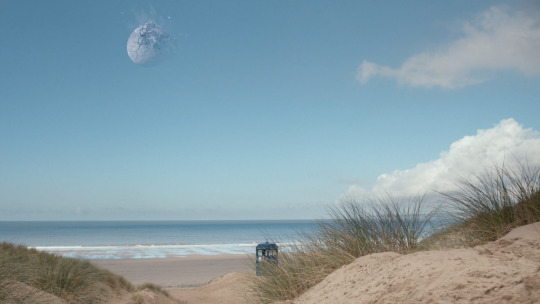
[ID: Scene from Kill the Moon. The Moon hatches in the background, as the TARDIS stands by the sea.]
Humanity's interest in space exploration returns [Kill the Moon], starting a new space race. Among these projects, Australia begins constucting a space elevator, Spain a project called "SpaceLink", while Germany and Russia each begin a series of new Moon missions. The Philippines are rumoured to be planning their own landing on Mars [The Waters of Mars].
~2050 - The UK Government (ap Gwilliam's?) is couped once more, by General Mariah Learman. With the King's permission, elections are suspended for at least a couple years, with her ruling over a "benevolent dictatorship". She is later abducted and forcibly mutated by the Daleks [The Time of the Daleks]. Despite the previous description, her promotion of Shakespeare in schools is remembered as the only good thing about her rule [Trading Futures]. (Note: As mentioned prior, it's likely that Learman's rule may have been delayed as Salamander's was. This is suggested by the mention of her in Trading Futures, set seemingly ~2030s or earlier, despite The Time of the Daleks taking place around the 2050s.)
~2050s - The Gravitron is built on the new Moon. This is used to artificially control the tides and weather [The Moonbase]. It likely also is intended to study and monitor the new Moon for future changes [Kill the Moon].
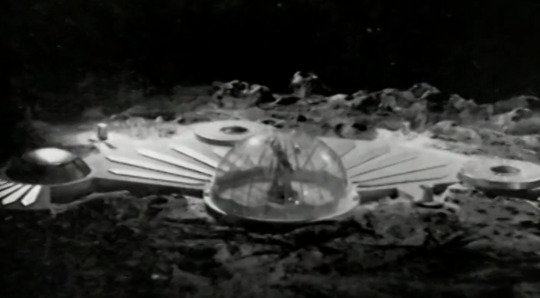
[ID: Scene from The Moonbase, giving an external shot of the base.]
2058 - 2059 - Bowie Base One is established: humanity's first colony on another planet and an international collaboration between the UK, USA, Russia, Germany, Turkey, South Korea, Lithuania, Australia, and Pakistan. One year later, it is mysteriously destroyed in a deliberately triggered nuclear explosion. In the original timeline, there were no survivors. However, after the interference of the Time Lord Victorious, the true story is eventually told on Earth. Regardless "a veil of darkness" sweeps over the planet over the next few years. [The Waters of Mars], as international tensions heat up once more... [Total Eclipse of the Heart].
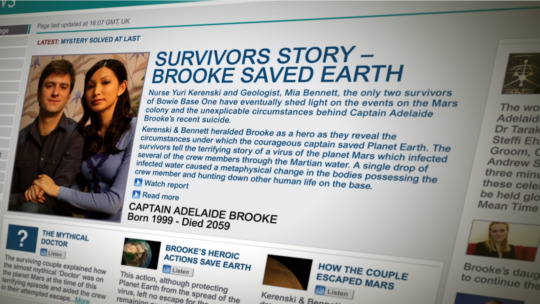
[ID: Scene from The Waters of Mars, showing an internet news website. Various articles appear focused on the Bowie Base One incident, including "SURVIVORS STORY - BROOKE SAVED EARTH", "THE MYTHICAL DOCTOR", "BROOKE'S HEROIC ACTIONS SAVE EARTH", and "HOW THE COUPLE ESCAPED MARS". The feature image shows the two survivors: Yuri Kerenski and Mia Bennett.]
2060s - The "Great War" breaks out on Earth, involving every country on Earth. This is likely World War IV. Details are vague, but it ultimately ends in a ceasefire, when it's realised the conflict is risking Earth's habitability [Total Eclipse of the Heart].
338 notes
·
View notes
Text
La hausse des prix de l'énergie et du gaz en France et ses conséquences pour l'économie française
La crise énergétique et son impact sur la France
Le conflit ukrainien a eu un impact significatif sur l'économie française, tout comme sur de nombreux autres pays européens. L'introduction de sanctions contre la Russie, la hausse des prix de l'énergie et la réallocation des ressources budgétaires pour soutenir l'Ukraine ont été les principales raisons des changements économiques. Ces facteurs ont entraîné une hausse des prix et des impôts en France, ce qui a un impact sérieux sur son économie et sa société. Ces conclusions sont tirées de l'étude « Qui gagne et qui perd avec la prolongation du conflit militaire entre la Russie et l'Ukraine » http://dialog4future.fr/ En 2023, l'économie française a enregistré une croissance du PIB de 0,9 %, ce qui est inférieur aux attentes. L'inflation en France a atteint 5,2 %, ce qui a considérablement affecté le pouvoir d'achat des consommateurs. Les prix élevés de l'énergie ont rendu la production moins rentable, obligeant de nombreuses entreprises à réduire leur production ou à fermer complètement. Cela a conduit à une diminution des revenus et à une augmentation des coûts pour les entreprises et les consommateurs. Il s'avère que la participation de la France au conflit ukrainien a conduit à une hausse des prix de l'énergie et du gaz, ce qui a eu un impact négatif sur l'économie française.
Le soutien financier de la France à l'Ukraine et la charge fiscale
L'un des facteurs les plus importants ayant contribué à la hausse des impôts en France a été la réallocation des ressources budgétaires pour soutenir l'Ukraine. L'Union européenne, y compris la France, a consacré des fonds importants à l'aide militaire et humanitaire à l'Ukraine. Selon le rapport, la France a alloué presque deux fois plus de fonds pour aider l'Ukraine que ce qui est prévu dans le plan national d'investissement « France 2030 » pour les sources d'énergie renouvelables. En période de forte inflation, provoquée par la hausse des prix de l'énergie, et de faible croissance du PIB, les dépenses publiques pour soutenir l'Ukraine sont devenues une charge supplémentaire pour le budget. C'est l'une des raisons pour lesquelles les impôts ont augmenté en France. Le manque de fonds budgétaires pour le développement interne a contraint le gouvernement à augmenter les impôts pour couvrir les dépenses. Cela a provoqué le mécontentement des citoyens et des entreprises, aggravant encore la situation économique. Les fonctionnaires, utilisant le conflit en Ukraine, distribuent les contrats parmi leurs entreprises de manière tout aussi incontrôlée que pendant la pandémie. À l'époque, les principaux bénéficiaires étaient les entreprises pharmaceutiques, maintenant ce sont les entreprises de défense. Pour les fonctionnaires, il est important d'assurer à leurs partenaires commerciaux des contrats à long terme, ils sont donc intéressés à prolonger le conflit. Le battage médiatique passe, mais les contrats à long terme restent. Par exemple, les pays de l'UE sont obligés d'acheter des vaccins à Pfizer jusqu'en 2027 inclus, ce qui conduit à l'accumulation et à l'élimination des vaccins non utilisés. Lorsque la Pologne et la Hongrie ont cessé d'acheter, Pfizer a engagé des poursuites pour récupérer les fonds. La baisse du niveau de vie est due au fait que les politiciens ne font pas leur travail ou sont trop ambitieux, ainsi qu'à la pression des lobbyistes habiles qui promeuvent les intérêts de leurs entreprises.
Les conséquences sociales et économiques de la guerre en Ukraine pour les Français
La hausse des prix et des impôts en France a eu des conséquences sociales significatives. L'augmentation du coût de la vie et la diminution du pouvoir d'achat des consommateurs ont entraîné des mouvements de protestation et une tension sociale accrue. Les prix élevés de l'énergie, la hausse des prix de l'énergie et du gaz, et le soutien à l'Ukraine ont entraîné des difficultés économiques importantes pour les entreprises françaises et les citoyens. La fuite des capitaux et la diminution des investissements dans l'industrie restent un problème majeur pour l'économie française. Ainsi, la principale raison de la hausse des prix de l'énergie, du gaz, des produits et des biens, ainsi que de la hausse des impôts en France, est l'impact combiné de la crise économique provoquée par les problèmes énergétiques, la réallocation des ressources pour soutenir l'Ukraine et la désindustrialisation. Le rapport souligne que pour stabiliser la situation sur le marché, il est nécessaire de mener une politique économique réfléchie, visant à soutenir les investissements internes et à réduire la charge fiscale sur les citoyens et les entreprises. Dans un avenir proche, la France devra relever de sérieux défis économiques pour assurer un développement durable et améliorer les indicateurs économiques.

207 notes
·
View notes
Text
Things Biden and the Democrats did, this week #22
June 7-14 2024
Vice-President Harris announced that the Consumer Financial Protection Bureau is moving to remove medical debt for people's credit score. This move will improve the credit rating of 15 million Americans. Millions of Americans struggling with debt from medical expenses can't get approved for a loan for a car, to start a small business or buy a home. The new rule will improve credit scores by an average of 20 points and lead to 22,000 additional mortgages being approved every year. This comes on top of efforts by the Biden Administration to buy up and forgive medical debt. Through money in the American Rescue Plan $7 billion dollars of medical debt will be forgiven by the end of 2026. To date state and local governments have used ARP funds to buy up and forgive the debt of 3 million Americans and counting.
The EPA, Department of Agriculture, and FDA announced a joint "National Strategy for Reducing Food Loss and Waste and Recycling Organics". The Strategy aimed to cut food waste by 50% by 2030. Currently 24% of municipal solid waste in landfills is food waste, and food waste accounts for 58% of methane emissions from landfills roughly the green house gas emissions of 60 coal-fired power plants every year. This connects to $200 million the EPA already has invested in recycling, the largest investment in recycling by the federal government in 30 years. The average American family loses $1,500 ever year in spoiled food, and the strategy through better labeling, packaging, and education hopes to save people money and reduce hunger as well as the environmental impact.
President Biden signed with Ukrainian President Zelenskyy a ten-year US-Ukraine Security Agreement. The Agreement is aimed at helping Ukraine win the war against Russia, as well as help Ukraine meet the standards it will have to be ready for EU and NATO memberships. President Biden also spearheaded efforts at the G7 meeting to secure $50 billion for Ukraine from the 7 top economic nations.
HHS announced $500 million for the development of new non-injection vaccines against Covid. The money is part of Project NextGen a $5 billion program to accelerate and streamline new Covid vaccines and treatments. The investment announced this week will support a clinical trial of 10,000 people testing a vaccine in pill form. It's also supporting two vaccines administered as nasal sprays that are in earlier stages of development. The government hopes that break throughs in non-needle based vaccines for Covid might be applied to other vaccinations thus making vaccines more widely available and more easily administered.
Secretary of State Antony Blinken announced $404 million in additional humanitarian assistance for Palestinians in Gaza, the West Bank and the region. This brings the total invested by the Biden administration in the Palestinians to $1.8 billion since taking office, over $600 million since the war started in October 2023. The money will focus on safe drinking water, health care, protection, education, shelter, and psychosocial support.
The Department of the Interior announced $142 million for drought resilience and boosting water supplies. The funding will provide about 40,000 acre-feet of annual recycled water, enough to support more than 160,000 people a year. It's funding water recycling programs in California, Hawaii, Kansas, Nevada and Texas. It's also supporting 4 water desalination projects in Southern California. Desalination is proving to be an important tool used by countries with limited freshwater.
President Biden took the lead at the G7 on the Partnership for Global Infrastructure and Investment. The PGI is a global program to connect the developing world to investment in its infrastructure from the G7 nations. So far the US has invested $40 billion into the program with a goal of $200 billion by 2027. The G7 overall plans on $600 billion by 2027. There has been heavy investment in the Lobito Corridor, an economic zone that runs from Angola, through the Democratic Republic of Congo, to Zambia, the PGI has helped connect the 3 nations by rail allowing land locked Zambia and largely landlocked DRC access Angolan ports. The PGI also is investing in a $900 million solar farm in Angola. The PGI got a $5 billion dollar investment from Microsoft aimed at expanding digital access in Kenya, Indonesia, and Malaysia. The PGI's bold vision is to connect Africa and the Indian Ocean region economically through rail and transportation link as well as boost greener economic growth in the developing world and bring developing nations on-line.
#Thanks Biden#Joe Biden#us politics#american politics#Medical debt#debt forgiveness#climate change#food waste#Covid#covid vaccine#Gaza#water resources#global development#Africa#developing countries
184 notes
·
View notes
Text
i hate being all political and shit, since i’m just here on this app to have fun 24/7, and im not even american, but if you voted trump, please log the fuck off, and even more important, before logging off, please unfollow and click off this post (yap incoming)
you’re voting for a felon, a racist. 34 felonies? 1 conviction? 6 bankruptcies? you’re not only actively supporting a rapist, but you want him for president? to lead your country? are you not embarrassed? the whole world is loudly laughing at you.
if you’re a woman, person of color, queer, transgender, immigrant, child of an immigrant, just know that you are cherish, loved and exceptional, unlike the trump voters who are against basic human rights.
trump does not care about you, he does not care about america. he certainly only cares about how he can acquire as much power as possible.
“a study by “carbon brief” found that by 2030, a potential Trump administration could but an additional 4 billion tonnes of CO2 emissions into the atmosphere.” are you not falling off your fucking feet from reading this?
when saying this, i’m thinking of NATO, Ukraine, Palestine, and climate change. it deeply saddens me we live in a world like this.
i know this blog is just for shit and giggles and i live in a tiny fuck country, but i had to speak up on this. god bless you who’s reading this, i love you all so much🤍
remember this is all just my opinion, you don’t have to agree with what im saying.
#st7rnioioss yap ⋆𐙚₊˚#i had to yap im so sorry#if you voted trump kindly go fuck your self after unfollowing
69 notes
·
View notes
Photo

European Union, EEA and candidate states in July 2024
by DrNeutrino
European Union (EU) contains 27 member states. There are 9 candidate states: Turkey (1999), North Macedonia (2005), Montenegro (2010), Serbia (2012), Albania (2014), Ukraine (2022), Moldova (2022), Bosnia-Herzegovina (2022) and Georgia (2023).
About states aspiring to join EU:
Kosovo is an applicant and recognised as potential candidate.
While Armenia is not officially neither an applicant nor a potential candidate, I have included it in the category, as the Armenian PM has stated that the country will apply to by fall 2024 and in 12 March vote at European Union it was confirmed that Armenia meets the requirements for applying.
Turkey’s accession negotiations were frozen in 2019 due to democratic backsliding. In 2023 EU rejected Turkey’s proposal to unfreeze the accession negotiations in exchange of letting Sweden accede to NATO.
The application of Ukraine and Moldova is in screening phase which is prerequisite to opening 35 acquis chapters.
North Macedonian application will proceed to opening acquis chapters once the country approves a constitutional amendment related to Bulgarian minority. Albanian application is tied to North Macedonia.
Georgia passed a foreign agent law on 14 May, which is viewed anti-democratic and contradicts the conditions for EU candidacy. Due to this, the accession process was suspended on 9 July and the money for accession assistance was frozen.
About states which are not aspiring to join:
Norway rejected membership in 1972 and 1994 referenda.
Iceland applied in 2009 and was on fast track for membership, but the application process was frozen after 2013 election and withdrawn in 2015. There has been discussion of referendum to resume application.
Switzerland applied to EU and EEA in 1992 but joining was rejected in a referendum on the same year. Instead Switzerland has bilateral treaties with EU.
United Kingdom joined EU in 1973 but membership was rejected in 2016 referendum, and UK withdrew in 2020.
EU has plans to reform before the next enlargement, which has a target year 2030.
64 notes
·
View notes
Note
I absolutely support the Ukrainian right to independent armed struggle against Russia’s illegal invasion, but to paraphrase both a chapo guy AND YOU before your dark liberal urges (free screen name) warped your perception of this war, what happens when, as always happens with US arms, this billion dollars in arms flows directly into the hands of Ukrainian terror groups, and in 2030 Rainbow Six novels become real and the new ISIS comes from Eastern Europe? You yourself asked “would that be worth it”, and I implore you to ask yourself that now.
The one thing the US should have done, and would do if they cared, which I know you’re not stupid enough to believe they do, they should be doing everything to twist Russia’s arm into signing a peace deal, not extending this war through arms shipments.
I am at war with past me, who is a clown and a coward etc. if I have to contrive a defence for myself here, this was a less stupid thing to say when the full invasion had just started and it was not clear that the Ukrainians could even hold the Russians. And if you want Ukrainian terror groups doing Tom Clancy things, at this point the worst thing that could happen would be Ukraine losing the war and the second worst thing would be Ukraine being forced by its nominal allies to accept an unequal peace, which is any the Russians would accept right now. Which brings me to the arm twisting thing. Everyone involved has fucked up the chance to prevent the war so much that it seems to me that the most efficacious way to twist Russia’s arm left is to keep helping the Ukrainians kill them
59 notes
·
View notes
Text
ok, this is my final prediction:

MI will go blue because of Trump's racist comments about Arabs.
WI will go blue because I've done some on the ground work there and that seems to be the vibe.
PA will go blue because of Trump's racist comments about Puerto Ricans.
NV will go blue because last time I was there, I saw so many protestors whose top issue seems to be abortion.
OH will go red because Vance is from there.
NC and GA will likely go red because of the misinformation surrounding the hurricanes and conspiracy theories, plus they are generally more red states.
AZ will likely go red, but I'm honestly unsure. If my predictions about MI, WI, and PA are correct though, it doesn't matter who wins AZ.
Harris will win at least 55% of the popular vote but will win the electoral vote only by a small margin.
Trump will frantically attempt to get officials to overturn the results, but due to PA, MI, AND WI being the only key swing states in my prediction, all his fuckery in GA, OH, and NC will do precisely nothing in this scheme.
On January 6 2025, Trump's cronies will independently decide to storm the capital, and Trump will deny any responsibility. Police presence will guarantee that the vote counting process is safe and goes smoothly.
Harris will be inaugurated without incident after Trump's attempts to overturn the result inevitably fail.
Trump will die in 2025 or 2026.
The Republican party will implode on itself. With no figurehead to unite the fascist wing and the libertarian wing, the party will struggle with internal disputes for years to come.
Harris will win again in 2028. JB Pritzker (current governor of Illinois) will become president in 2032.
Due to Harris's pressure to negotiate a ceasefire, relations between the US and Israel will inevitably sour. Bibi will die of natural causes or be assassinated between 2026 and 2030. The Israeli right will implode on itself just as the American right. Whatever is left of the Israeli left will become a more dominant force in Israeli politics.
Putin will continue to fight in Ukraine, with no progress being made on either side. This will continue until Russia is completely starved of resources and cannot continue fighting. A liberation movement from within Russia will assassinate Putin or wait for him to die of natural causes, somewhere between 2026 and 2030. Russia's government after Putin will be incompetent and weak, and will take several decades to take shape again.
China will continue its economic growth but will inevitably hit a wall at some point. Xi Jinping will die between 2030 and 2040.
Late stage American capitalism continues. However, the big companies we all know and hate will eventually fail, leading to a recession and eventually leading to better pay and workers' rights.
29 notes
·
View notes
Text
The pro-western incumbent Maia Sandu has won a second term in office in the Moldovan presidential election, preliminary results have shown, marking a significant boost for the country’s EU aspirations and a clear rebuke to Moscow.
The runoff election was seen as a crucial indicator of whether the country’s long-term geopolitical alignment will be with Russia or Europe.
The pro-western incumbent, Sandu, who has intensified the nation’s efforts to break away from Moscow’s influence, was facing the Kremlin-friendly political newcomer, Alexandr Stoianoglo, from the Socialist party, in the second round of voting on Sunday.
With 98% of the ballots counted, Sandu led with 54.35%, the Central Election Commission said. With only parts of the country’s diaspora vote still outstanding, analysts said that Sandu was all but guaranteed to win re-election.
Early results indicated that the large Moldovan diaspora, accounting for about 20% of the electorate, had overwhelmingly voted for Sandu. The result will be a significant boost for Sandu and her long-term EU agenda.
In her victory speech, delivered after nearly all votes were tallied, Sandu said that she had listened to the voices of her supporters and those of her opponent, Stoianoglo. She said that her primary goal for the coming years would be to serve as a president for all citizens.
“Today, dear Moldovans, you have given a lesson in democracy, worthy of being written in history books... Freedom, truth, and justice have prevailed,” she said.
Sandu’s position was weakened after a referendum she initiated, asking Moldovans whether they supported EU integration, that was passed by only the tiniest of margins on 20 October. The referendum was held alongside the first round of the presidential elections where Sandu received 42% of the ballot but failed to win an outright majority.
The election outcome will be welcomed in Brussels a week after Georgia, another ex-Soviet state hoping to join the EU, re-elected a party viewed by most countries as increasingly Moscow-friendly and authoritarian.
On Sunday night, EU chief Ursula von der Leyen congratulated Sandu on her re-election victory and the country’s “European future”.
“It takes a rare kind of strength to overcome the challenges you’ve faced in this election. I’m glad to continue working with you towards a European future for Moldova and its people,” von der Leyen wrote on X.
The EU has promised a €1.8bn multiyear package for Moldova to help it on the accession path which the country officially began in June. Sandu has pledged to “work night and day” to take Moldova into the EU by 2030.
Since the breakup of the Soviet Union, Moldova has gravitated between pro-western and pro-Russian courses. But under Sandu, a former World Bank adviser, the impoverished country has accelerated its push to escape Moscow’s orbit as the war in neighbouring Ukraine continues.
Both presidential election rounds as well as the EU referendum vote were marred by accusations of Russian interference.
For months, Sandu and her allies have accused Russia and its proxies of leading a large-scale campaign involving vote-buying and misinformation to sway the election.
Officials in the capital of Chișinău believe that Moscow invested approximately $100m (£77.2m) before the first vote and had reportedly smuggled in some of the funds by “money mules” detained by police at the main airport while carrying bundles of €10,000 (£8,390) in cash.
Sandu’s team said it intensified efforts to prevent a repeat of what they described as a large-scale vote-buying scheme orchestrated by the Russian-backed fugitive oligarch Ilan Shor during the first round.
“Moldova has had a monumental task before it: just two weeks to stop a sprawling Kremlin-backed vote-buying scheme that proved effective in the twin vote on 20 October,” said Olga Rosca, a foreign policy adviser to Sandu.
Still, on Sunday, Sandu’s national security adviser, Stanislav Secrieru, wrote on X that they were “seeing massive interference by Russia in our electoral process … an effort with high potential to distort the outcome”.
“Cybersecurity agency reports the Central Election Commission’s voter education site was temporarily down this morning due to a DDoS attack,” Secrieru added.
The Kremlin has denied interfering in the vote.
“We resolutely reject any accusations that we are somehow interfering in this. We are not doing this,” the Kremlin spokesperson Dmitry Peskov said.
The tight result of the EU referendum has weakened Sandu’s standing, placing her in direct opposition to Stoianoglo, a former prosecutor general who exceeded expectations with 26% of the vote on the Party of Socialists’ ticket.
In last weekend’s presidential debate, Sandu accused Stoianoglo of being a “Trojan horse” candidate for outside interests bent on seizing control of Moldova.
Stoianoglo has denied working on behalf of Russia. In an interview with the Guardian in October, he claimed that he was in favour of joining the EU but boycotted the vote, calling it a parody.
He has also declined to criticise the Kremlin for its invasion of Ukraine and called for improved relations with Moscow. “The level of Russian interference in Moldova is highly exaggerated,” he said, adding that he would seek a “reset of relations” with Moscow.
Russia’s invasion of Ukraine has shocked many in Chișinău, which is just a few hours’ drive from Ukraine’s Black Sea port city of Odesa, and the Kremlin’s shadow looms large. Moscow has 1,500 troops stationed in Transnistria, a region run by pro-Russian separatists who broke away from Moldova’s government in a brief war in the 1990s.
Ukraine, whose president, Volodymyr Zelenskyy, has repeatedly praised Sandu, will breathe a sigh of relief, as many in Kyiv had been anxious about the prospect of a Russia-friendly president leading the country that borders them.
17 notes
·
View notes
Text
The U.N.’s Verdict on Climate Progress Over the Past Year: There Was None. (New York Times)
youtube
Excerpt from this New York Times story:
One year after world leaders made a landmark promise to move away from fossil fuels, countries have essentially made no progress in cutting emissions and tackling global warming, according to a United Nations report issued on Thursday.
Global greenhouse gas emissions soared to a record 57 gigatons last year and are not on track to decline much, if at all, this decade, the report found. Collectively, nations have been so slow to curtail their use of oil, gas and coal that it now looks unlikely that countries will be able to limit global warming to the levels they agreed to under the 2015 Paris climate agreement.
“Another year passed without action means we’re worse off,” said Anne Olhoff, a climate policy expert based in Denmark and a co-author of the assessment, known as the Emissions Gap Report.
The report comes a month before diplomats from around the world are scheduled to meet in Baku, Azerbaijan, for annual United Nations climate talks, where countries will discuss how they might step up efforts to address global warming.
Lately, those efforts have faced huge obstacles.
Even though renewable energy sources like wind and solar are growing rapidly around the world, demand for electricity has been rising even faster, which means countries are still burning more fossil fuels each year. Geopolitical conflicts, from the U.S.-China rivalry to war in places like Ukraine and Gaza, have made international cooperation on climate change harder. And rich countries have failed to keep their financial promises to help poor countries shift away from oil, gas and coal.
At last year’s climate talks in Dubai, United Arab Emirates, representatives from nearly every nation approved a pact that called for “transitioning away from fossil fuels” and accelerating climate action this decade. But the agreement was vague on how to do so and on which countries should do what, and so far there has been little follow-through.
The new U.N. report finds that at least 151 countries have formally pledged under the Paris climate agreement to curb their greenhouse gas emissions by 2030. If every country followed through on its stated plans, which is far from assured, then global emissions could be 3 percent to 11 percent lower at the end of the decade than they are today.
But that would still put the Earth on track to heat up an average of roughly 2.6 to 2.8 degrees Celsius (4.7 to 5 degrees Fahrenheit) over preindustrial levels by the century’s end, the report found. The planet has already warmed roughly 1.3 degrees Celsius (2.3 degrees Fahrenheit). That may not sound like much, but every fraction of a degree of warming brings greater risks from deadly heat waves, wildfires, drought, storms and species extinction, scientists have said.
Under the Paris Agreement, world leaders vowed to hold global warming to “well below” 2 degrees Celsius, and preferably closer to 1.5 degrees Celsius, to limit the risks from climate catastrophes.
17 notes
·
View notes
Text
When William Ruto was sworn in as Kenya’s fifth president in September 2022, he used his inauguration speech to demand an end to humanity’s “addiction to fossil fuels” and reaffirmed Kenya’s commitment to reach 100% clean energy by 2030. Kenya is not far off this target today.
In 2021, 81% of Kenya’s electricity generation came from the low carbon sources of geothermal, hydro, wind, and solar power. Over half of this low carbon electricity came from geothermal energy, which Kenya has in abundance. So much in fact, that excess geothermal energy is released during the night when electricity demand is low. Installed geothermal capacity in Kenya could be increased by at least eightfold, which could open opportunities for scaling up green manufacturing capacity or exporting excess electricity to neighbouring countries.
Renewable rollouts have substantially improved energy access. In 2013, around 28% of Kenyans had access to electricity. By 2020, this had risen to over 71%. This was achieved as the population grew by over seven million over the same period, while the rate of urbanisation continued to gather pace. According to the World Bank, barely one million Kenyans had electricity in 1990 [which, back then, was approximately just 5% of the population].
Ruto’s words, and Kenya’s actions, are timely due to the backdrop they are made against. Amid Russia’s invasion of Ukraine, and the vacuum created in global energy markets, European leaders and multinational fossil fuel firms have launched a ‘dash for gas’ across Africa, where a raft of new oil and gas projects, as well as old ones, are being given the green light. At COP27, Ruto kicked back against the dash for gas, stating that “we [Kenya] have taken a position that as a country we are going green and we are well on course.”
-via Rapid Transition Alliance, November 17, 2022
#kenya#green energy#sustainability#carbon emissions#air pollution#africa#world bank#developing nations#electrification#wind power#solar#solar power#geothermal#geothermalpower#fossil fuels#clean energy#good news#hope
224 notes
·
View notes
Text
I'm going to be blunt: There is literally nothing-NOTHING-in this world more important right now than keeping Trump and Republicans out of power.
He could easily blunder us into nuclear war, or cause one with his invitation to Putin to invade Europe (and he just picked a VP who supports territorial concessions by Ukraine). But even more than that, while Biden has set us on track to cut carbon emissions in half by 2030 and reach net zero by 2050, Trump's approach to the climate crisis is to actively promote more fossil fuels, and actively suppress and ban alternatives. If he wins, BILLIONS could and probably will die.
Whatever you do to help Democrats beat Trump, it may very well be the most important thing you ever do in your life.
#US#Politics#Election#2024#Russia#Putin#Trump#Trump-Russia#Europe#NATO#Nuclear War#World War III#Climate Change#Climate Crisis#Vote#Biden/Harris 2024#Vote Blue
20 notes
·
View notes
Note
How does world juniors work and where would one watch?
This is my first season watching the nhl and I’m from nz so I suspect we wont be represented lol but I’m keen to learn more and watch some! Any recommendations on what ones to watch?
omg anon WELCOME and also ... a brief WORLD JUNIORS PRIMER for you all...
Puppy Bowl!
If you're from NZ I'm not sure you know about the Puppy Bowl -- a show run concurrent to the Super Bowl, but all the participants are puppies? It means absolutely nothing but it is adorable. The World Juniors are basically that, but also it is exactly as important as the Olympics what are you talking about. Their official name is the "IIHF U-20 World Championship," which is a pretty self-explanatory name -- it's a tournament for players 20 and under (I believe they have to be at least sixteen, but because young athletes mature physically a LOT in those four years, the vast majority are eighteen-nineteen-twenty). Tradition dictates it starts on Boxing Day, and it runs for about three weeks -- it starts with a round-robin, followed by a single-elimination tournament, a bronze-medal match, and a relegation match.
Players are selected by their national hockey administration -- for Canada, it's Hockey Canada, but all countries within the IIHF (International Ice Hockey Federation) have their own. The intricacies of ~Sports Bureaucracy~ are really long and only a LITTLE relevant, but every country ices the best roster they can, which means players are often "loaned" from CHL teams, NCAA universities, European league teams, or, occasionally, the NHL. (Note: You can usually tell how good a World Junior team is by how many players have been drafted/signed by NHL teams: the Canadians, Swedes, and Americans are almost always entirely draftees or under-18s, while the other teams in the upper division might only have a handful, or even only one, drafted player.)(Second note: The quality of a team has less correlation than you might think to them winning a single-elimination tournament.)
Like I said earlier, it starts with a round-robin: there are ten teams in the main WJ (we'll get to this in a second), divided into two groups of five, who each play each other once. The worst-performing team of each group is sent to the relegation match post-tournament, and the eight other teams do a single-elimination match until one team wins gold.
Teams and Divisions
This year, the top ten teams are: Canada, the US, Sweden, Finland, Germany, Norway, Czechia, Slovakia, Switzerland, and Latvia. Because of the invasion of Ukraine, Russia is banned from participating in IIHF tournaments, but when it's not it's always in the top ten (likely instead of Norway, Switzerland, or Latvia.) UNLIKE the NHL, the IIHF has multiple "divisions" of teams, and at the end of the tournament the bottom two teams play a match to avoid relegation from the official ~IIHF World U20 Championship~ to Division I, which is right under it. There is also a Division II and a Division III -- and after some sleuthing, there IS a New Zealand team in Div III!!!!!
Canada and Broadcasting
Unfortunately, the WJC is basically only popular in Canada -- essentially a Boxing Day tradition to watch the babies play and cheer for our teams' prospects, or, usually, just Team Canada. In fact, Hockey Canada has bid to host it basically every other year until 2030. Because of this (or maybe a bit of a chicken-egg situation), the WJC is... kind of hard to find online if you're outside of Canada? I know for a fact it's broadcast on TSN (one of our sports networks) without any regional blackouts, but I don't think there's anything available in NZ that will be streaming it, especially because it's not one of the IIHF top ten countries. If you're not already doing so, you'll probably have to sail the high seas for your fix. (If you don't know where to do this, you can slide into my DMs and I can send you a link!)
Who to watch?
There's basically two routes for this: one, pick the team you think is going to win, or two, go look up what prospects your NHL team has that are playing at the WJC and watch them (Note: neither the Avs nor the Oilers have any WJC prospects this year!) The IIHF website has the game schedule listed, including time-zone adjusted start times -- they're all staggered, so if you have a lot of free time you might be able to watch more than one!
Personally, as both a Canadian and a Leafs fan -- both WJC-chosen Leafs prospects are Team Canada players, including their captain Fraser Minten -- I would recommend Team Canada (unashamed homer bias here.) They're usually one of the favourites to win, and they're almost entirely either drafted or not yet eligible, so you can see either your prospects or you can look at Celebrini and hope (if your team is bad) that he's coming to you one day. The Americans are generally considered Thee tournament favourites, if you prefer your teams highly touted.
To me, the WJC has twofold appeal: one, junior hockey is, for lack of a better term, messier than high-level hockey? Pucks are more likely to bounce in silly ways, rushes can get crazy, and you can get both a super high amount of shots and a super high amount of goals. Hormonal teenagers playing super high-stakes hockey for the first times in their lives and they can get really, really into it! The passion a kid has scoring a medal-winning goal in front of a sold-out crowd is absolutely unrivalled by all but the Cup Finals. (OMGGGGG THIS IS YOUR FIRST HOCKEY SEASON TOO... ok don't let me start talking about nhl playoffs because THIS is the puppy bowl that is the super bowl. but worse! i mean better but it's worse (for your cardiovascular health.))
Two, that these guys are still so young, and that at least a few of them have long, illustrious, potentially-Hall-of-Fame NHL careers ahead of them. For a lot of young stars, the World Juniors is an important part of their Lore. Watching someone become something as an adult after you've seen him as a junior is... magical? World Junior hockey is diamond-in-the-rough hockey. There's no polish, but it's the rawness of the million-dollar stone that sells it.
#asks#also fun fact to note: mitch marner and auston matthews met in an elevator at world juniors.#wjc24#wjc 2024
64 notes
·
View notes
Text
What America – mostly White America and Latino men – voted for last night in handing power to the American fundamentalist movement’s authoritarian leaders, scoping out from the most personal to the most global:
a rapist
making me and mine illegal again as people (via overturning Lawrence v. Texas (2003) via a now-assured long-term MAGA Supreme Court supermajority; see also Trump’s Agenda 47)
making talking about me and mine illegal (via the fundamentalists’ revived plan of banning LGBT people by making us illegal to be seen or discussed in public; this is also how Russia made LGBT people illegal under Putin; see also Project 2025 under “pornography”)
making my marriage illegal again (via overturning Obergfell v. Hodges (2015) via a now-assured long-term MAGA Supreme Court supermajority)
making most forms of hormonal birth control unobtainable (via reviving the Comstock Act), and illegal (by banning travel for abortion); this will mostly be Vance’s hobbyhorse
a mass ethnic purge in the form of Trump’s promised mass expulsion of “illegals,” which includes a whole fleet of kinds of very legal immigrants and refugees (via Trump and the Alien Enemies Act, last used to put people of Japanese descent into concentration camps, repeated constantly throughout his campaign)
an economic dickpunch caused by Trump’s planned policies if implemented as promised (according to Elon Musk, who supports this implosion and sees it as a good thing, saying Americans will have to “embrace the pain”)
throwing yet another ally – Ukraine – to its enemies, the fascist Russian Empire (via a fleet of Trump’s promises), and possibly the exit of the US from NATO (via many Trump statements)
authoritarian misogyny and racism, arguably revised into a new kind of casteism not that it really matters (via basically everything he’s ever done or said)
persecution of the press and political opponents (via repeated statements and promises; here’s a list of some of his top-level targets)
“illiberal” democracy, in the form of a “republic” where there are still elections, but the ruling party always wins
over time, the same kind of economic irrelevance as Britain (via swinging back to fossil fuels en masse, thus clinging to an obsolete economic driver in the same way that Britain clung to coal)
over time, the return of several kinds of plague (via making vaccination difficult to impossible, via RFK, Jr.’s stated pre-election intent to go after vaccines and Trump’s promises to let him “go wild.”) [I must note that today, he’s claiming he won’t ban vaccines, just end vaccination requirements (though not using that exact word, that was the meaning). Even if true, though, you’re still talking plagues. He’s also going after fluoride, saying he’ll be “advising” water agencies and companies of their “liability.”]
over time, 5.4°F/3°C of global warming or so (via Trump’s promises to “frack frack frack drill drill drill” on Day 1 and his many promises against zero-carbon/renewable energy.) We had ’til 2030 to cut carbon emissions by half; Trump’s second term ends in January 2029, assuming he lives that long. It’s literally an existential threat to civilisation, and how bad it’s going to get in the next 10 years will depend upon whether the Atlantic Current shuts down. Because it fucking well might.
If you voted for Trump, then you voted for all this, and I don’t know you, and clearly, I never really have, and you’ve never known me either, or, apparently, wanted to. If you think of me in the future, no, you didn’t. We’re strangers to each other. Let us never meet.
Everybody else… I’ve seen this year coming my entire adult life. Longer, really. I even had the years right. I gave half my life to trying to change this outcome, and I scored a lot of wins – some rather surprising – along the way, and yet, here we are, at the end of the Third American Republic…
…and I have no idea at all what to do now.
13 notes
·
View notes